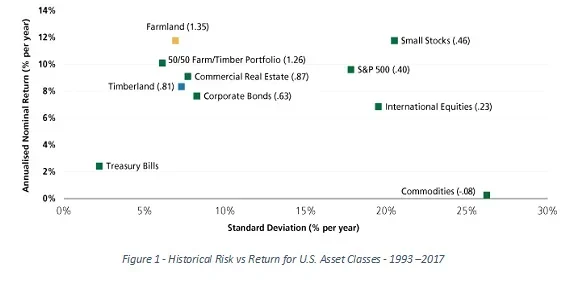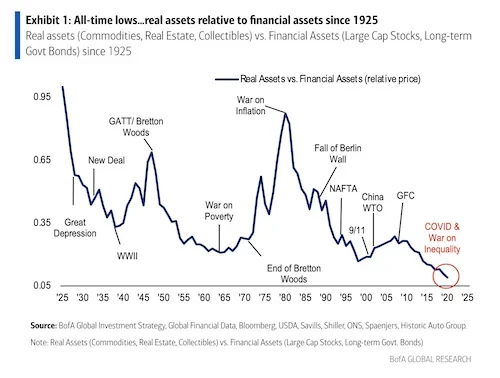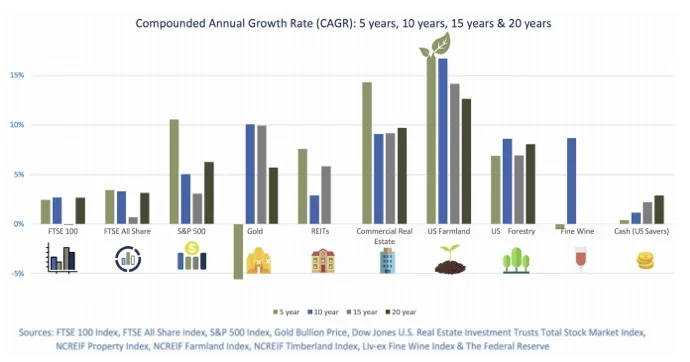Your point is well-taken. I would only add that zero interest rates (ZIRP), negative interest rates (NIRP), and the level of government intervention in asset buying that we have seen in the markets over the past thirteen years are quite unprecedented in all of human history, much less during the last 200 years.
We have now entered a new paradigm. Diversification and rebalancing many not be enough. Investors must be nimble when the great reset occurs. The days of building a Permanent Portfolio of an equal allocation of stocks, bonds, gold, and cash may be gone, because most assets are now correlated -- all rising in price because of low interest rates and all dropping in price during a liquidation event.
https://www.investopedia.com/terms/p/permanent-portfolio.asp
I've heard all about this and believed this stuff too.. the whole enchilada of ZIRP\NIRP, Fed intervention, all markets are fake, bubbles everywhere, stock market is fake, plunge protection team, only Gold is real, and all the words that the perma-bears love to say. This "knowledge" cost me a lot of money. Perma-bears should (generally) be avoided as they are wrong 99.99% of the time. In fact even if you know sure that there will be a 50% crash some time this decade, you should be invested as the gains you will miss out on, are bigger than 50% (assuming 7% yearly which is pretty average and assuming you can't pick the bottom).
I keep hearing for decades about "the great crash", Liquidation Event, "The big crash to end all crashes", "The end of the financial system", Peter Schiff, Jim Rogers and all the other gurus have been peddling these stuff for decades and conspiracy-minded people love this stuff. They have been completely wrong for decades on end. Of course they blame Fed intervention for their mistakes in prediction but the truth is, the world is developing, there are great new companies being born every day and plenty of new markets that are developing. In the meantime there were very few real crashes (2000, 2007) and even when there was a real crash the market recovered in a 3-7 years (yes, even in
1929), anybody that listened to them missed out on huge gains. And diversification would have saved you from almost any one of these crashes. The permabear scare-tactics are mostly just for pushing their subscribers to buy gold for which they receive commission. Same reason many of these gurus offer some "agriculture project" in a far away land, like Panama or Peru that promises high yield % but somehow ends up being a scam.
The problem with all these theories is that if you tell people about ZIRP\NIRP\Fed\Bubbles in all assets you sound clever and intelligent. Whereas if you just say "The global markets will probably grow 5-9% this year" you sound like just an average clown with no special insight. We did not really enter a new paradigm. Read economic history books from the 50s and 60s and you will see that the Fed was intervening back then as well and people were afraid of money printing just as they are now. I agree that the intervention in 2020 was huge and really risky\stupid\inflationary, but overall balanced\diversified portfolio will win in the long term. Or just buy Gold and hope it will somehow perform better than it did in the last 100 years
These people are not there to educate you. Their goal is to scare you so they can sell you their scams, be it Gold, some shady agriculture project, or their "top secret stock picks that turned $1100 into $3.4M".
This chart below shows how the richest families in the world invest. These are the top of the top, they are not stupid and they receive the best advice that money can buy. There still are ways to find assets that are uncorrelated and sustain crashes. It's better to learn and emulate them and not copy the big loser Peter Schiff (or Jim Rogers or any other permabear that missed any important trend in the last 20 years)
https://pbs.twimg.com/media/ENo_9vyU8AA0ZlL?format=jpg&name=900x900



